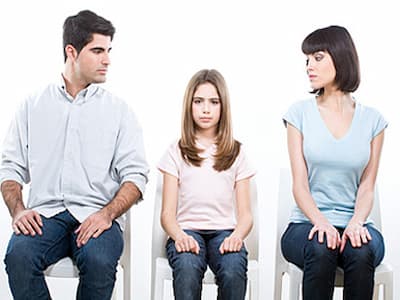6 Ways to handle co-parenting after separation/divorced
It has been discovered that co-parenting allows separated or divorced couples to remain active in their children’s lives.

6 Ways to handle co-parenting after separation
Whether through divorce or separation, when the ties that are holding a relationship together breaks and there is no chance of healing, the results might include suffering, regrets, and violence. However, the burden of the argument or dispute also falls on the kids, relatives, and friends that the connection brought together. But those who suffer the most are children.
Parental separation was found to be associated with a higher risk of negative effects on the mental health of children aged seven or older, according to a 2019 study that involved over 6.5k children and young people in the UK.
It further explained that children’s mental health issues, anxiety, and depression were known to be caused by family dissolution.
These kids were shown to be more prone than kids from stable homes to experience emotional and behavioural issues in addition to mental health issues.
Divorce rates are reportedly rising. Kenya was placed sixth with a divorce rate of 0.6 out of the nine African nations with the highest divorce rates in 2021, according to Divorce.com.
Couples can continue to be active in their children’s lives even after divorcing. Though obviously attainable, that can be challenging at times. A parent may, for instance, decide to move to a different town, state, or even another country. A parent can also want nothing to do with the partner or anything associated with the relationship if there has been a harsh breakup.
It has been discovered that co-parenting allows separated or divorced couples to remain active in their children’s lives.
Here are some Six pointers on managing co-parenting:
Make a plan.
In a conversation with our correspondent, Brian mentioned that equitable and inclusive parenting practices are essential for divorced families. Feeling excluded from their child(ren)’s life is another reason for disputes between divorcing spouses. Therefore, having a template and following it is crucial for divorced parents who have decided to co-parent their kids.
READ ALSO; Police Rescue Man From Mob After Killing Wife at Her Parent’s Home
According to Brian, in order to have a clear approach with their children, it is necessary to for divorced or separeted couples to create a parenting plan with each other. He went on to say that in order to ensure they don’t exclude any crucial material, they can adhere to a template, such as the court’s document or the Custody X Change parenting plan template.
Know where you are willing to make concessions when negotiating your parenting strategy. Prepared to clarify any provisions you will firmly require in a calm and collected manner. Strike a balance between flexibility and consistency. While the main rules and parenting styles of the two families should be similar, give each parent their own space.
Have a schedule
Children of divorced parents require their parents’ participation in their lives, according to family lawyer and divorce and breakup counsellor Aronke, better known as Sisi Lawyer. She added that co-parenting following a divorce was a novel situation.
A family coach Aronke said, “Parents often place the child in the middle of the fight because there are still a lot of hurts.” The fundamental argument for why children of divorced parents are thought to suffer comes from this. Thus, the parents need to follow a schedule.
The sole tool for keeping track of spending, journaling events, recording real time, and organising everything in one location is a schedule. A schedule is supposed to lessen friction and the need for frequent journeys to the courthouse or attorney’s office.
A schedule is something that needs to be decided upon and adhered to by all parties. It could be a normal, seasonal, vacation, or special occasion parenting routine.
Slowly introduce changes
Children of separated or divorced parents, statistics stated, mostly suffer emotional pain and stigma. In most cases, it takes time for the children to adjust to new changes and they could be experiencing fear and uncertainty, which could be expressed through angry outbursts, tantrums or withdrawal from social activities.
Don’t try to introduce too many parenting changes at this time. Your children are already dealing with upheaval, so it’s generally a good idea to continue your previous parenting techniques as much as possible.
Respect boundaries
Statistics showed that the majority of children of separated or divorced parents experience stigma and emotional suffering. Children typically need some time to get used to new situations and may be feeling scared or uneasy, which may show up as tantrums, angry outbursts, or withdrawal from social interactions.
READ MORE; Eve Mungai’s New YouTube Channel; Eclipsed 11K Subscribers Hours After Launch
At this point, try not to introduce too many modifications to your parenting style. As your kids are already adjusting to change, it’s usually a good idea to stick to your previous methods of parenting.
Consider your child’s interest
It may be challenging for couples who have a contentious split or divorce to desire to interact with one another in the future. While this makes sense, you also need to realise that your kids are experiencing the grief of their parents’ separation and are concerned about what will become of them now that they are no longer together. No matter what the circumstances, children need to be raised appropriately.
There must be no feelings involved and the child must be raised appropriately. When the mother is granted legal custody and the father fails to return the child home on schedule during visitation, the mother does not have the right to become upset. Instead, a consensus must be reached on the kids’ bedtime, duties, etc. Since the couples are no longer in a romantic or loving relationship, whatever said here must be in the best interests of the child. This is not about them. She pointed out that the kids needed to be fully informed of their decision to live and raise their children apart.
Be Civil to Your Ex
Divorced couples need to learn how to get along with each other for the sake of the kids, especially when they’re at an event that involves the kids. Planning for co-parenting is a conscious endeavour that needs to be done by both parents. Divorced couples are urged by family coach not to tell their kids bad or derogatory things about their former partners.
According to a family coach, this could lead to emotional strain for the kids, who might feel guilty or even believe that they are to blame for their parents’ separation or divorce. The divorce coach also suggested that instead of putting their arguments on social media, couples should seek legal mediation as a means of settlement.
When there is discord in a couple, a lot of things need to be addressed. Couples are also urged against going to court and instead to refer themselves to mediation, which is a better step towards dispute resolution than publicly washing their dirty laundry.


1 thought on “6 Ways to handle co-parenting after separation/divorced”
Comments are closed.